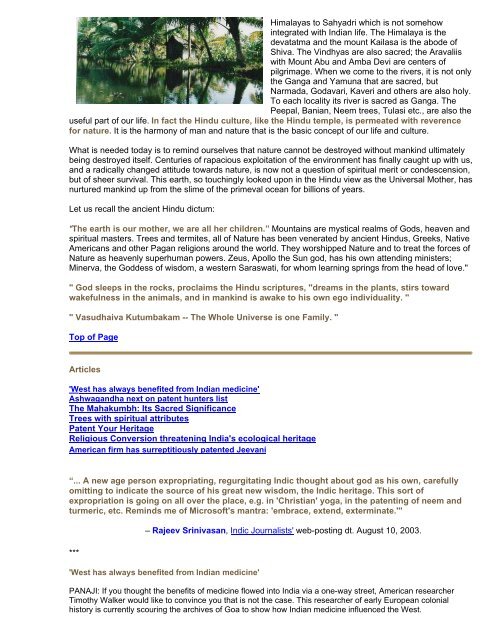A Tribute to Hinduism - Nature Worship - Mandhata Global
A Tribute to Hinduism - Nature Worship - Mandhata Global
A Tribute to Hinduism - Nature Worship - Mandhata Global
You also want an ePaper? Increase the reach of your titles
YUMPU automatically turns print PDFs into web optimized ePapers that Google loves.
Himalayas <strong>to</strong> Sahyadri which is not somehow<br />
integrated with Indian life. The Himalaya is the<br />
devatatma and the mount Kailasa is the abode of<br />
Shiva. The Vindhyas are also sacred; the Aravaliis<br />
with Mount Abu and Amba Devi are centers of<br />
pilgrimage. When we come <strong>to</strong> the rivers, it is not only<br />
the Ganga and Yamuna that are sacred, but<br />
Narmada, Godavari, Kaveri and others are also holy.<br />
To each locality its river is sacred as Ganga. The<br />
Peepal, Banian, Neem trees, Tulasi etc., are also the<br />
useful part of our life. In fact the Hindu culture, like the Hindu temple, is permeated with reverence<br />
for nature. It is the harmony of man and nature that is the basic concept of our life and culture.<br />
What is needed <strong>to</strong>day is <strong>to</strong> remind ourselves that nature cannot be destroyed without mankind ultimately<br />
being destroyed itself. Centuries of rapacious exploitation of the environment has finally caught up with us,<br />
and a radically changed attitude <strong>to</strong>wards nature, is now not a question of spiritual merit or condescension,<br />
but of sheer survival. This earth, so <strong>to</strong>uchingly looked upon in the Hindu view as the Universal Mother, has<br />
nurtured mankind up from the slime of the primeval ocean for billions of years.<br />
Let us recall the ancient Hindu dictum:<br />
“The earth is our mother, we are all her children.” Mountains are mystical realms of Gods, heaven and<br />
spiritual masters. Trees and termites, all of <strong>Nature</strong> has been venerated by ancient Hindus, Greeks, Native<br />
Americans and other Pagan religions around the world. They worshipped <strong>Nature</strong> and <strong>to</strong> treat the forces of<br />
<strong>Nature</strong> as heavenly superhuman powers. Zeus, Apollo the Sun god, has his own attending ministers;<br />
Minerva, the Goddess of wisdom, a western Saraswati, for whom learning springs from the head of love."<br />
" God sleeps in the rocks, proclaims the Hindu scriptures, "dreams in the plants, stirs <strong>to</strong>ward<br />
wakefulness in the animals, and in mankind is awake <strong>to</strong> his own ego individuality. "<br />
" Vasudhaiva Kutumbakam -- The Whole Universe is one Family. "<br />
Top of Page<br />
Articles<br />
'West has always benefited from Indian medicine'<br />
Ashwagandha next on patent hunters list<br />
The Mahakumbh: Its Sacred Significance<br />
Trees with spiritual attributes<br />
Patent Your Heritage<br />
Religious Conversion threatening India's ecological heritage<br />
American firm has surreptitiously patented Jeevani<br />
“... A new age person expropriating, regurgitating Indic thought about god as his own, carefully<br />
omitting <strong>to</strong> indicate the source of his great new wisdom, the Indic heritage. This sort of<br />
expropriation is going on all over the place, e.g. in 'Christian' yoga, in the patenting of neem and<br />
turmeric, etc. Reminds me of Microsoft's mantra: 'embrace, extend, exterminate.'"<br />
***<br />
– Rajeev Srinivasan, Indic Journalists' web-posting dt. August 10, 2003.<br />
'West has always benefited from Indian medicine'<br />
PANAJI: If you thought the benefits of medicine flowed in<strong>to</strong> India via a one-way street, American researcher<br />
Timothy Walker would like <strong>to</strong> convince you that is not the case. This researcher of early European colonial<br />
his<strong>to</strong>ry is currently scouring the archives of Goa <strong>to</strong> show how Indian medicine influenced the West.

















